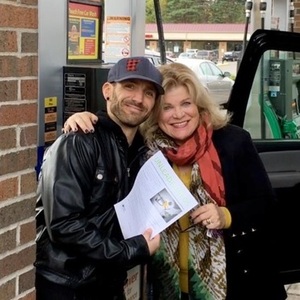Minnesota Bio-Fuels Association rewards drivers who chose E15

Minnesota Bio-Fuels Association
October 13, 2017
BY Minnesota Bio-Fuels Association
The Minnesota Bio-Fuels Association and KS95 FM teamed up Oct. 11 to reward drivers who chose E15 (Unleaded Plus) at the Holiday station on Centerville Road in White Bear Lake.
From 12:30 pm to 1:30 pm, MBA and KS95 rewarded 45 drivers who switched to E15 from regular unleaded.
KS95's Rudy Pavich was at the station with MBA staff to educate drivers on the benefits of using E15, which is cheaper than regular unleaded but has a higher octane value and lower carbon emissions.
Advertisement
Advertisement
Among the rewards given included $20 in cash, $25 gift vouchers to Chili's and KS95 merchandise.
"This is the fifth time we've partnered with KS95 this year to encourage drivers to use a clean fuel that is made in Minnesota and makes America more energy independent," said Tim Rudnicki, MBA executive director.
Advertisement
Advertisement
The Holiday station in White Bear Lake is one of over 50 stations in the Twin Cities metro area that offers E15. Throughout Minnesota, there are over 170 stations that offer E15.
Last week, the Minnesota Department of Commerce announced E15 sales in Minnesota in 2017 as at the end of August totaled 6.45 million gallons, breaching the 6-million-gallon-mark for the first time.
Related Stories
The U.S. Department of Energy’s Office of Energy Efficiency and Renewable Energy is soliciting public comments on a preliminary plan for determining provisional emissions rates (PER) for the purposes of the 45Z clean fuel production credit.
On July 17, Iowa’s cost-share Renewable Fuels Infrastructure Program awarded $1.12 million in grants for 20 applicants to add B11 and 4 applicants to add E15 to retail sites. This was the first meeting following the start of RFIP’s fiscal year.
Par Pacific Holdings Inc., Mitsubishi Corp. and ENEOS Corp. on July 21 announced the signing of definitive agreements to establish Hawaii Renewables LLC, a joint venture to produce renewable fuels at Par Pacific’s refinery in Kapolei Hawaii.
A new study published by the ABFA finds that the U.S. EPA’s proposal to cut the RIN by 50% for fuels made from foreign feedstocks, as part of its 2026 and 2027 RVOs, could stall the growth of the biomass-based diesel (BBD) industry.
The European Commission on July 18 announced its investigation into biodiesel imports from China is now complete and did not confirm the existence of fraud. The commission will take action, however, to address some systemic weaknesses it identified.
Upcoming Events










